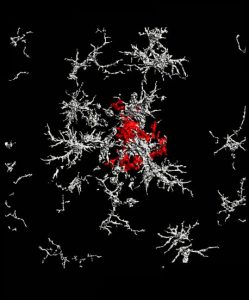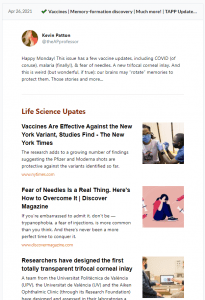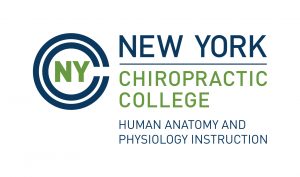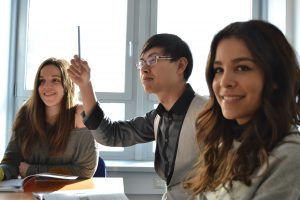Are We Answering Student Questions? | Science Updates | TAPP 92
Release Date: 05/03/2021
 Steve Sullivan on Teaching A&P Bit by Bit: Podcasts, Digital Learning, & Keeping It Human | TAPP 156
Steve Sullivan on Teaching A&P Bit by Bit: Podcasts, Digital Learning, & Keeping It Human | TAPP 156
The A&P Professor
Steve Sullivan joins me for a lively conversation about podcasting, tutor videos, and digital A&P teaching. We explore how he humanizes online learning, why students crave multiple approaches, and what he’s learned after 23 years of teaching. From LMS-independent course design to global podcast reach, Steve shares practical strategies and inspiring stories that can help any A&P instructor evolve their teaching. 0:00:00 | Introduction 0:00:49 | This Episode 0:02:28 | Becoming Steve Sullivan 0:06:41 | Your Teaching Voice* 0:07:30 | Why Start a Podcast? 0:14:03 | Farewell to TAPP ed*...
info_outline Dual Enrollment in A&P: Murray Jensen on Rigor, Pedagogy, and Community | TAPP 155
Dual Enrollment in A&P: Murray Jensen on Rigor, Pedagogy, and Community | TAPP 155
The A&P Professor
Murray Jensen joins Kevin Patton to explore dual enrollment in anatomy & physiology. From guided inquiry to the power of teacher communities, this conversation reveals why messy classrooms often yield the best results. 00:00 | Introduction 00:48 | Murray Jensen, HAPS President's Medal Laureate 02:27 | What Is Dual Enrollment, Anyway? 11:44 | Two-Word Check-In* 12:53 | Guided Inquiry, Not Guided Napping 25:51 | Concept Echo* 26:37 | No, Not Nightly Recorded Lectures 31:09 | Rigor Reality Check* 32:11 | Rigor, Range, & Real Talk 39:25 | Respect Reframe* 40:02 | Why It Matters:...
info_outline 10 Reasons Why Mucus Is Our Friend | TAPP 154
10 Reasons Why Mucus Is Our Friend | TAPP 154
The A&P Professor
Kevin Patton tackles one of A&P’s slimiest subjects: mucus. In this playful but powerful episode, he reveals ten (or eleven) reasons mucus deserves more attention in our teaching. From immunity to fertility, mucus does it all. 00:00 | Introduction 00:45 | Mucus & Mucous 04:27 | Virtual HAPS Conference * 05:41 | Mucus: Body-Wide Protector 10:13 | Gross Episodes * 11:15 | Mucus in Motion 15:46 | Kerry Hull Honored * 16:28 | Mucus & the Human Story 20:42 | Running Concept Lists 21:11 | Mucus is Vital 26:05 | Staying Connected * Breaks ★ If you cannot see or activate the audio...
info_outline Pulse Check: A Year in Review & What’s Next for A&P Teaching | TAPP 153
Pulse Check: A Year in Review & What’s Next for A&P Teaching | TAPP 153
The A&P Professor
"It's tough to make predictions, especially about the future," said Yogi Berra, but that's never stopped me before! In this annual episode, we'll revisit last year's educational forecasts, explore what's popped (and what's fizzled), and check the tea leaves (and little gray cells) once again. With help from colleague Jerry Anzalone—and some cheeky assistance from AI—we'll bravely map out what's next for anatomy and physiology education, all seasoned with empathy, wit, and a cautionary look at history’s lessons. Buckle up: predicting the future is a bumpy—but fascinating—ride! 0:00 |...
info_outline Fascinating Fascia: Kate Oland Galligan Unravels the Ties That Bind | TAPP 152
Fascinating Fascia: Kate Oland Galligan Unravels the Ties That Bind | TAPP 152
The A&P Professor
Episode 152 centers on a lively conversation between Kevin and Dr. Kate Oland Galligan as they trace her path from a curious undergrad to a passionate fascia educator and clinician. The duo challenges old perceptions of fascia, recounting stories from early lab experiences where fascia was simply “ripped out,” and contrasting them with new insights on its dynamic, interconnected nature. They reveal how subtle fascial restrictions can cause significant clinical symptoms—linking pelvic imbalances to jaw pain—and explore the emerging field of mind-body connections in fascial therapy....
info_outline Muscling Through Barriers: The A&P Student Accommodations Handbook Unveiled | TAPP 151
Muscling Through Barriers: The A&P Student Accommodations Handbook Unveiled | TAPP 151
The A&P Professor
In Episode 151 of The A&P Professor podcast, host Kevin Patton is joined by Jennifer Stokes, Rachel Hopp, and Abbey Breckling to discuss the Anatomy and Physiology Student Accommodations Handbook. This handbook released by the Human Anatomy and Physiology Society (HAPS), provides instructors with evidence-based suggestions and best practices for making A&P labs and classrooms more inclusive and accessible for all students. Developed by a HAPS subcommittee, the handbook offers guidance on accommodating students with a wide range of needs, from physical limitations to visual or hearing...
info_outline Textbooks to Slides: IP Attorney Brenda Ulrich on Legal Image Use in Anatomy & Physiology | TAPP 150
Textbooks to Slides: IP Attorney Brenda Ulrich on Legal Image Use in Anatomy & Physiology | TAPP 150
The A&P Professor
In Episode 150 of The A&P Professor podcast, host Kevin Patton speaks with intellectual property attorney Brenda Ulrich about copyright law and image use in education. They discuss how educators often mistakenly assume they have rights to use textbook images and the complexities of permissions that expire. Brenda highlights the differences in legal standards for physical versus online teaching and emphasizes the importance of understanding licensing agreements and fair use. By the end, listeners gain valuable insights into legally and ethically incorporating multimedia into their anatomy...
info_outline Examining the Anatomy & Physiology Exam: Chatting with Greg Crowther and Ben Wiggins | TAPP 149
Examining the Anatomy & Physiology Exam: Chatting with Greg Crowther and Ben Wiggins | TAPP 149
The A&P Professor
In episode 149 of The A&P Professor podcast, host Kevin Patton chats with Greg Crowther and Ben Wiggins about their work with exams in the anatomy and physiology (A&P) course. They discuss the importance of exams in assessing student learning and the need for exams to be more connected to course objectives. They also mention the challenges of designing exams that are fair and inclusive for all students. Crowther and Wiggins are conducting a survey on A&P exams and encourage listeners to participate to contribute to the understanding of exam practices in the A&P community. The...
info_outline Blueprints for Learning: Justin Shaffer on Structured A&P Course Design | TAPP 148
Blueprints for Learning: Justin Shaffer on Structured A&P Course Design | TAPP 148
The A&P Professor
In Episode 148, Justin Shaffer joins host Kevin Patton to discuss high structure course design. Justin shares his success in building a scaffold for learning by using a variety of course structures to improve student engagement and success, such as pre-class and post-class activities, micro-case studies and clicker questions, brief active learning practices, and much more. 00:00 | Introduction 00:46 | Introducing Justin Shaffer 02:49 | High Structure and Low Structure 20:47 | Badge Break 21:43 | Transparency, Expectations, & Flexibility 34:06 | Secret Code: TAA Conference in Nashville...
info_outline Pulse of Progress: Looking Back, Moving Forward | TAPP 147
Pulse of Progress: Looking Back, Moving Forward | TAPP 147
The A&P Professor
In Episode 147, host Kevin Patton reviews the highlights and events of the previous year in the world of The A&P Professor. He then turns to last year's predictions for teaching human anatomy and physiology to see if he was on the right track. Finally, predictions for the coming year are revealed. And lots of other stuff—this episode is two hours long, after all! 0:00:00 | Introduction 0:00:50 | Debrief: Topics, Stats, Reflections 0:21:28 | A Long, Long, Long Episode 0:23:05 | Debrief: More Reviewing & Reflecting 0:38:59 | Did I Get My Predictions Right? 0:50:22 | Textbook &...
info_outlineEpisode 92 is all about how we can use customer-service concepts in education. Tune in and hear Kevin Patton discuss the importance of being a good listener and empathetic responder. You’ll also hear about new research that shows not all plaques are bad actors when it comes to Alzheimer disease. And finally, find out how to get free almost-daily updates on life science, teaching, and learning!
- 00:00 | Introduction
- 00:53 | New Discovery about Plaque
- 08:33 | Sponsored by AAA
- 09:51 | New TAPP Science & Education Updates
- 15:23 | Sponsored by HAPI
- 16:45 | Are We Answering Student Questions?
- 30:52| Sponsored by HAPS
- 31:40 | Power Skills for Answering Students
- 40:19 | Staying Connected
If you cannot see or activate the audio player click here.
Apply for your credential (badge/certificate) for listening to this episode.
Please take the anonymous survey: theAPprofessor.org/survey
Questions & Feedback: 1-833-LION-DEN (1-833-546-6336)
Follow The A&P Professor on Twitter, Facebook, Blogger, Revue, Tumblr, or Instagram!
Get the almost-daily TAPP Science & Education Updates
The most basic of all human needs is the need to understand and be understood. The best way to understand people is to listen to them. (Ralph Nichols)
New Discovery about Plaque
7.5 minutes
In teaching A&P, it's not our objective to dive too deeply into pathophysiology. But we do use it as a tool to help students understand and apply concepts of "normal" structure and function. A new discovery about plaque's role in Alzheimer disease—or perhaps what is NOT its role—is a story that at once helps students make clinical applications, lets students know more about the vital functions of glial cells, and gives a glimpse of contemporary scientific discovery.
- Plaque Protect: Study Makes Surprising Finding About Alzheimer's Hallmark (summary article) my-ap.us/3aJFzCy
- In surprising twist, some Alzheimer’s plaques may be protective, not destructive (announcement from Salk Institute) my-ap.us/2S9BvW5
- Microglia use TAM receptors to detect and engulf amyloid β plaques (research article from Nature Immunology) my-ap.us/3eBEf5S
- Image: dense-core amyloid-beta plaque (red) surrounded by microglia (white) [Credit: Salk Institute] my-ap.us/3gFlp0l
Sponsored by AAA
1.5 minute
A searchable transcript for this episode, as well as the captioned audiogram of this episode, are sponsored by the American Association for Anatomy (AAA) at anatomy.org.
Don't forget—HAPS members get a deep discount on AAA membership!
New TAPP Science & Education Update
5.5 minutes
You may (or may not) remember that Nuzzel newsletter I've had going a couple of years. It was an almost-daily curated list of headlines of interest to anatomy and physiology faculty (and, I've discovered, some random non-A&P folks who just like the content). Well, Nuzzel is suddenly shutting down it's newsletter function and so I've switched to Revue by Twitter. Here's how to subscribe (it's free) if you're not already subscribed:
- The A&P Professor Science & Education Updates theAPprofessor.org/updates
Sponsored by HAPI Online Graduate Program
1.5 minute
The Master of Science in Human Anatomy & Physiology Instruction—the MS-HAPI—is a graduate program for A&P teachers, especially for those who already have a graduate/professional degree. A combination of science courses (enough to qualify you to teach at the college level) and courses in contemporary instructional practice, this program helps you be your best in both on-campus and remote teaching. Kevin Patton is a faculty member in this program. Check it out!
Are We Answering Student Questions?
14 minutes
No, really. Am I really answering what each student wants to know? Or am I simply reacting to key words or phrases without really listening to the specifics of each student question. This segment asks us to consider using some customer-service (gasp!) techniques to make sure we're not leaving our students alone and frustrated.
- Some previous episodes that touch on the customer-service model and student questions
- Information on TextExpander—a tool for quickly inserting saved snippets of text (I am an affiliate)
- The Case for Case Studies | Episode 52 (has a segment discussing TextExpander
- theAPprofessor.org/textexpander
Sponsored by HAPS
1 minute
The Human Anatomy & Physiology Society (HAPS) is a sponsor of this podcast. You can help appreciate their support by clicking the link below and checking out the many resources and benefits found there. Watch for virtual town hall meetings and upcoming regional meetings!
Power Skill for Answering Students
8.5 minutes
Starting with some "power phrases" from a recent article, we explore some words and phrases to use when answering student questions.
- These 7 phrases can help you sound more powerful at work (article mentioned in this segment) my-ap.us/3eykP1N
If the hyperlinks here are not active, go to TAPPradio.org to find the episode page.
- More details at the episode page.
- Transcript available in the transcript box.
- Listen to any episode on your Alexa device.
- Need help accessing resources locked behind a paywall? Check out this advice from Episode 32 to get what you need! https://youtu.be/JU_l76JGwVw?t=440
Take The A&P Professor experience to the next level!
The A&P Professor community
Earn cash by referring other A&P faculty to this podcast:
theAPprofessor.org/refer
Tools & Resources
- TAPP Science & Education Updates
- Amazon
- Text Expander
- Rev.com
- Snagit & Camtasia
- Krisp Free Noise-Cancelling App
- The A&P Professor Logo Items
Sponsors
- Transcript and captions for this episode are supported by the American Association for Anatomy | anatomy.org
- The Human Anatomy & Physiology Society provides marketing support for this podcast | theAPprofessor.org/haps
- Distribution of this episode is supported by NYCC's online graduate program in Human Anatomy & Physiology Instruction (HAPI) | nycc.edu/hapi
Clicking on sponsor links helps let them know you appreciate their support of this podcast!
Follow The A&P Professor on Twitter, Facebook, Blogger, Revue, Tumblr, or Instagram!
The A&P Professor® and Lion Den® are registered trademarks of Lion Den Inc. (Kevin Patton)
As an Amazon Associate I earn from qualifying purchases. I may be compensated for links to sponsors and certain other links.







